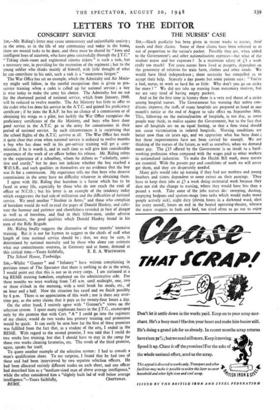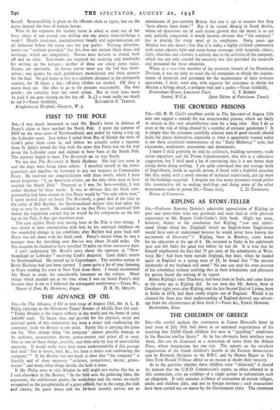THE NURSES' CASE
Snt,—Much puolicity has been given in recent weeks to nurses, their' needs and their claims. Some of these claims have been referred to as out of proportion to the nation's pocket. Possibly they are, when added to the Government's and other nationalisation expenses—but what of the student nurse and her expenses ? Is a minimum salary of £3 a week really too much? For years nurses have lived as paupers, dependent on the generosity of relatives for train fares, clothes and other needs. We would have liked independence ; sheer necessity has compelled us to accept their help. Scarcely a day passes but some patient says : "You're a fool, nurse, to work so hard for so little. Why don't you go on strike for more ? " We did not take up nursing from mercenary motives, but we are very tired of having empty pockets.
And so for the first time in history there is a very real threat of a strike among hospital nurses. The Government has warning that unless con- ditions improve, the staffs of many hospitals are prepared to hand in one month's notice at the end of August to take effect on September 30th. This, following on the nationalisation of hospitals, is not due, as some people may think, to malice against the Government, but to the fact that now all hospitals are on an equal footing, so that a firm stand should not cause victimisation in isolated hospitals. Nursing conditions are better now than six years ago, and we appreciate what has been done ; but these improvements have not been carried far enough. We are thinking of the nurses of the future, as well as ourselves, when we demand more pay. The £15 offered by the Government is an insult to a hard- working profession when compared with the wages paid to other workers in nationalised industries. To make the Health Bill work, more nurses are essential. With the present pay and conditions of work we will never get them, and they are desperately needed.
Many girls would take up nursing if they had not mothers and young brothers and sisters dependent to some extent on their earnings. They have to keep their jobs at ,C5 a week doing secretarial work because they dare not risk the change to nursing, where they would have less than a pound a week. Take some of the jobs nurses do: sweeping, dusting, emptying bedpans and sputum-mugs (two tasks which would make many people actively sick), night duty (eleven hours in a darkened ward, alert for every sound), hours on end in the heated operating-theatre, whence the nurse staggers to bath and bed, too tired often to go out to enjoy berself. Responsibility is given to the efficient clerk or typist, but on the nurse depend the lives of human beings.
What of the expenses the student nurse is asked to meet out of her basic salary of one pound, one shilling and one penny three-farthings a week ? Health insurance, unemployment benefit and superannuation are all deducted before the nurse sees her pay packet. Nursing advertise- ments say "uniform provided," but this does not include black shoes and stockings, which are compulsory. Nurses have lectures to attend, both off and on duty. Text-books are required for studying and notebooks for writing up the lectures ; neither of these are cheap items today. Exams, are inevitable. In future nurses must pay the full fees them- selves ; one guinea for each preliminary examination and three guineas for the final. No girl wants to live in a uniform, designed in the nineteenth century, for 24 hours a day ; off-duty clothes are needed. Off duty a nurse must eat. She likes to go to the pictures occasionally. She may smoke ; she certainly buys her sweet ration. Bus or train fares must be paid if she goes visiting on her day off. Is £3 a week really too much to ask ?—Yours faithfully, ELIZABETH F. TEMPLE. Knightswood Hospital, Glasgow, W.3.



































 Previous page
Previous page